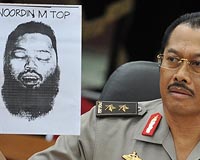 |
Amman, Jordan (UPI) Oct 26, 2010 As Islamic militants escalate their war against the Russians in Dagestan, Ingushetia and other Caucasian republics, there is evidence that Arab jihadists, particularly Jordanians, are playing a leading role, as they did in the Chechen wars. In recent months, Jordanian newspapers and Web sites have reported the death of several Jordanians fighting in Chechnya. But it is the growing links between the Islamist fighters in the Caucasus and influential clerics in the Hashemite Kingdom and its environs who preach global jihad that are probably more important. The well-known Jordanian jihadist ideologue Sheik Abu Mohammed al-Maqdisi has gathered a following among the Caucasian Islamists, even corresponding with Arabic-speaking commanders who want to shift the conflict from a nationalist struggle into part of the global jihad. Maqdisi is a powerful influence in Arab jihadist circles and since 2009 "has become an active promoter and propagandist of the jihadist movement in the North Caucasus," says Murad Batal al-Shishani of the Jamestown Foundation, a Washington think tank that tracks global terrorism. Maqdisi achieved notoriety as the spiritual mentor of the ferocious al-Qaida leader in Iraq, Abu Musab al-Zaraqwi. Zarqawi, a Jordanian Sunni who fought in Afghanistan, forged al-Qaida in Iraq into the most bloodthirsty jihadist organization fighting the Americans after the 2003 invasion. His forces slaughtered hundreds of people, including rival Shiites, until he was killed in a U.S. airstrike June 7, 2006. His ruthless ferocity made him a hero among Jordanian Islamists and inspired several major plots in the kingdom. These included a thwarted 2004 chemical attack on Jordan's Intelligence Directorate in Amman. These activists are "a new generation of Salafi-jihadists in the region who can be described as neo-Zarqawists," al-Shishani noted in a recent analysis. "These young militants consider themselves the inheritors of Abu Musab al-Zarqawi's legacy in the Levant." Many have gone to Afghanistan and Pakistan to fight, among them Humam Khalil Abu-Mulal al-Balawi, the suicide bomber who set off his device inside a CIA base in Afghanistan in December 2009, killing seven CIA personnel. Most of these activists are centered on the cities of Zarqa, Zarqawi's hometown east of Amman, and Irbid in northern Jordan. Anas Khalil Khadir, a 24-year-old Jordanian reported to have been killed in Chechnya in early June, was from Zarqa. He abandoned his medical engineering studies at university there to go to Chechnya. A few days after Khadir's death was reported, newspapers announced the death of another Jordanian in Chechnya. They said Yasser Ammara, described as "a prominent Jordanian-born warlord," was one of nine militants killed fighting Russian forces in the forested mountains of the Vedeno region. He had been in Chechnya since 2000. In recent months, jihadist Web sites and Internet forums have increasingly focused on the escalating conflict across the Caucasus, several years after the Russians crushed insurgents in the Second Chechen war. The revival of jihadist interest in the region "comes in the context of two strategies that al-Qaida and affiliates Salfist-jihadist groups are implementing: seeking safe havens and creating a grassroots jihad that will sustain them," al-Shishani wrote in a recent analysis. Arab jihadists, mostly veterans of the 1979-89 war against the Soviet army in Afghanistan, have played a prominent role in the North Caucasus since 1995 when the First Chechen War broke out. They fought under the leadership of separatist leader Dzhokar Dudayev, killed like Zarqawi in a missile strike in 1996. The most prominent of these Arabs was a commander known as Emir Khattab, an Afghan veteran whose real name was believed to be Omar Ibn al-Khattab. He was reputed to have been born in Saudi Arabia to a Jordanian father and a Circassian mother. At age 16, he went to Afghanistan to fight the Soviets in Afghanistan, where he met Osama bin Laden. He is also believed to have fought in Tajikistan and Bosnia. In Chechnya, he came one of the jihadists' most successful combat commanders and was wounded several times leading his own private army of Arabs, Turks and other foreign fighters. He was killed by Russia's Federal Security Service, the post-Cold War successor of the KGB, on March 19, 2002, with a poisoned letter. Chechen sources said it was coated with "a fast-acting nerve agent, possibly sarin or a derivative."
Share This Article With Planet Earth
Related Links The Long War - Doctrine and Application
 Indonesia launches torture investigation
Indonesia launches torture investigationJakarta (UPI) Oct 25, 2010 Indonesia's military has promised an investigation into the torture of several Papuan villagers, an act caught on video and circulated by a human rights group. The authenticity of the 10-minute graphic video initially was questioned by Indonesian authorities, saying it was a propaganda stunt by separatist groups in Papua, the country's eastern-most and largest province. The Asian ... read more |
|
| The content herein, unless otherwise known to be public domain, are Copyright 1995-2010 - SpaceDaily. AFP and UPI Wire Stories are copyright Agence France-Presse and United Press International. ESA Portal Reports are copyright European Space Agency. All NASA sourced material is public domain. Additional copyrights may apply in whole or part to other bona fide parties. Advertising does not imply endorsement,agreement or approval of any opinions, statements or information provided by SpaceDaily on any Web page published or hosted by SpaceDaily. Privacy Statement |